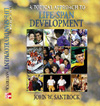 |  Life-Span Development: A Topical Approach John W. Santrock
Cognitive Processes and Development Cognitive Developmental Approaches
Learning Objectives1.Discuss how cognitive developmental theory focuses on the development of children's rational thinking, with an emphasis on stages of thought and how thoughts are the primary determinants of behavior, noting concepts that are especially important in Piaget's theory:- adaptation
- assimilation
- accommodation
| - organization
- equilibration
|
|
 |  |  | 2.Understand sensorimotor thought as the way in which the infant organizes and coordinates sensations with physical movements nonsymbolically, through six substages that extend from birth to about 2 years, and acknowledge how Piaget opened a new path to look at infants that has generated much research and many revisions. |
 |  |  | 3.Discuss how preoperational thought is the beginning of the ability to reconstruct at the level of thought what has been established in behavior during its two substages, symbolic function (ages 2 to 4 years) and intuitive thought (ages 4 to 7 years). |
 |  |  | 4.Describe how operations, conservation, classification, seriation, and transitivity develop in the concrete operational thought stage (ages 7 to 11 years), noting that thought is not as abstract as later in development. |
 |  |  | 5.Explore formal operational thought (ages 11 to 15), including:- how it is a time of abstraction, idealism, and logic
- contrasted with its special kind of egocentrism that includes the imaginary audience and a personal fable
- the early and late subphases, noting the individual variation among adolescents
|
 |  |  | 6.Apply and evaluate Piaget's theory, considering:- even though he was not an educator his constructivist ideas have been applied to education
- his contributions to the field of cognitive development through his brilliant observations of children and creation of many masterful concepts
- the criticisms of his theory, such as questions of his estimates of competence at different developmental levels, his stage concept, and that his view is not specific enough
|
 |  |  | 7.Explain Vygotsky's sociocultural cognitive theory of development, including his concepts of the zone of proximal development (ZPD), scaffolding, and links between cognitive and language development, then compare his theory with that of Piaget, focusing on constructivism, stages, key processes, the role of language, views on education, and teaching implications. |
 |  |  | 8.Discuss the adult cognitive developmental stages, including:- Piaget's belief that formal operational thought is the final stage, although adults are quantitatively more knowledgeable than adolescents
- Replacement of idealism with more realistic, pragmatic thinking and Perry's view that adolescents engage in dualistic, absolute thinking while young adults tend to think reflectively and relativistically
- Postformal thought as being qualitatively different from formal operational thought, involving reflective thinking, situational variation, and the evasiveness of truth, as well as an understanding that solutions to problems need to be realistic and cognition may be influenced by emotion
|
|



 2002 McGraw-Hill Higher Education
2002 McGraw-Hill Higher Education